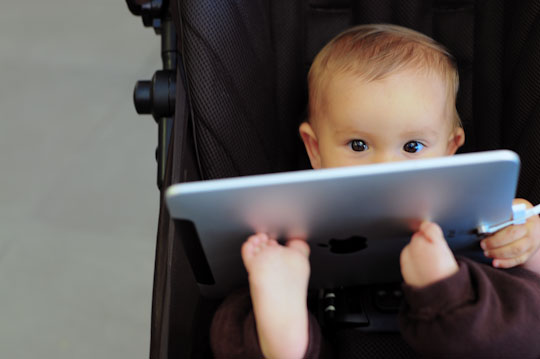A number of studies have described a phenomenon known as the video deficit. The video deficit posits that exposure to digital media is detrimental to children under 2 years old, because studies indicate that toddlers learn better from live presentations of information, rather than a video presentation. There is evidence that very young children can, in fact, learn from video presentations where simple actions are repeated or where the video is interactive in nature such as where actors ask questions to the child, and give time for viewers time to give a response. However, advocates of the “video deficit” argue that we are doing young children a disservice by allowing them screen access.
It is not that children under 2 do not learn from digital media, but that they may be limited in what they are able to understand from videos, television shows and games. My personal and professional concern is that too much digital media will take away from the time that toddlers need for “basic training,” such as squishing their food and throwing it on the floor, or running so fast that they fall down, or smelling something that they wish they hadn’t. In other words toddlers need to engage in the sensory motor activities that are crucial to early childhood learning. Given the explosion of apps and games targeted to young children, there is very little doubt (at least in this clinician’s mind) that we will find more and more parents talking about how their 18 month old knows the alphabet or has learned basic mathematical facts. As a result, more kids will be busy learning academics rather than take the time to smell the roses.
So, should you get a 16-month-old an iPad of his own? Probably not. Aside from the fact that he is likely to break it, everything we know about early childhood informs us that it is the interaction of a caring person to a child is the key to later emotional, social, and cognitive development. For example, we know that children who engage in more communication with their parents prior to the age of 4 will have better vocabularies and be more prepared for school. Children can hear lots of words on the television, but they are not direct and involve no type of call-and-response, limiting the chances of learning.
If you have a toddler and an iPad, too, you might’ve noticed that she is very interested in trying it out. Kids love media. Whether it be the interactivity of Sesame Street, a simple point-and-click game on Nintendo 3DS, or interactive book on a Kindle Fire, toddlers (like the rest of us) are likely to tune-in and want to try it out. While our team at LearningWorks for Kids loosely follows the American Academy of Pediatrics recommendations that limits the exposure to electronic screens prior to the age of 2, we do believe that there is a time and place for interacting with your child and digital media.
The key word here is interacting. It is this interactivity between parent and child that is the key to a young child’s learning and development. While children may not learn as much from a video screen (see our above discussion of the video deficit), we view the iPad, when used interactively with your child, as simply another toy for joint engagement.
A few simple suggestions that can help you in your decision making for children under the age of 2:
- Limit the amount of time you jointly spend in front of a screen to less than 1 hour per day.
- Always introduce or preview what you will be doing with the digital device with your child.
- Tie in your digital experiences with real-world experiences. For example, if you use a painting program or a letter recognition program on your iPad, do the same thing with physical materials.
- Be careful about how much time you devote to your own digital screens. Kids learn best from modeling.




